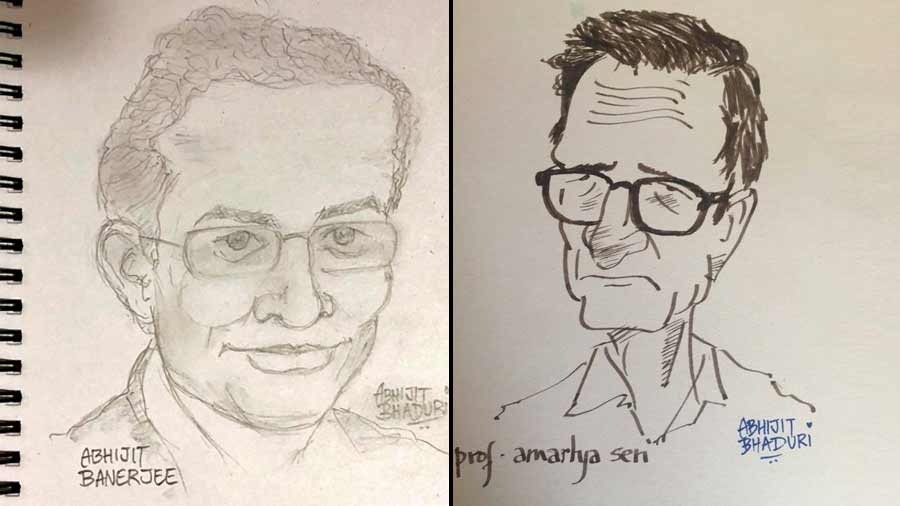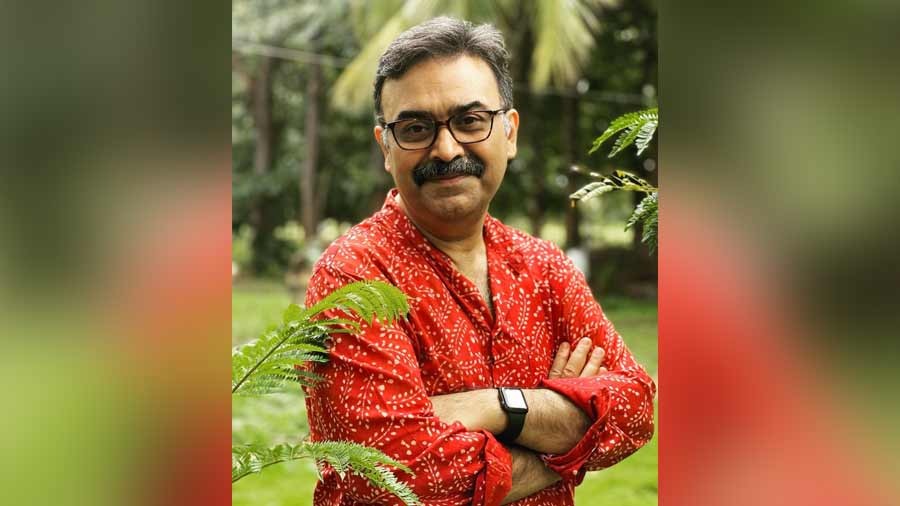I grew up in Delhi but I used to visit Kolkata twice a year. The first visit was during the summer vacations when I used to spend two months in the city. When the schools would shut down for the winter vacation, we would be in Kolkata once again. It was a ritual that remained unchanged as long as I was in school and college.
The large house off Gariahat used to bustle with activity with my aunts and uncles and my cousins. My grandmother (Dida) was the matriarch who ran the house. The house was brimming with activity. My father and my uncles sat around discussing politics, books, movies and more. Dida would talk to her four daughters about what was happening in everyone’s life. I hung around with my cousins. My older cousins whispered and giggled about their love lives. The younger ones read books, played board games and would pester the elders to take us out for a movie or play.

Sketches of Nobel Laureates (left) Abhijit Banerjee and (right) Amartya Sen by Abhijit Bhaduri
All her stories were about the past
My grandmother was a great storyteller. She told us stories about the Bengal Famine, the Partition and how they came in as penniless refugees. She talked about her childhood. All her stories were about the past. The present and future were noticeably absent.
By the time I was in college, my cousins and I all knew every story and anecdote by heart. We had heard it a hundred times. As soon as she would start telling a story, the cousins would make some excuse and disappear one by one. I felt bad for Dida but there was nothing I could do to help her add new stories to her collection.
By the time I was in the final years of my school, Dida was bedridden. Her contact with the outside world was limited to what we told her. She disapproved of everything that was happening in the world around.
She was content living in the past. Nothing new had happened in her world because she had stopped listening to others. She had no desire to listen to what my cousins wanted to share because she was too judgmental and disapproving of everything they did. She wanted to tell us the same stories, but the grandchildren had heard them all before. The stories had started to go stale. She would interrupt my cousins to abruptly start recounting a story from the past. Everyone would groan and politely walk away. “She belongs to the museum,” someone whispered.

‘Kolkata is like my Dida. All the stories I hear in Kolkata are about the golden past,’ says Abhijit
When someone wants to talk about the past, ask them about the future
She had become like a stagnant pond. I wish Dida would listen to the grandchildren’s stories. They would have been her window to the world.
Kolkata is like my Dida. All the stories I hear in Kolkata are about the golden past. When someone wants to talk about the past, ask them about the future. Nobody can take away our past but we need to look at the road ahead while driving.
Old stories are precious, but we have heard them many times over. I wanted to tell Dida not to shut off my cousins when they wanted to talk about life in their college. I wanted to tell her about what I saw around me in Delhi, but Dida had no desire to listen. She never changed because the first sign of change comes from the stories.
I hope Kolkata will learn from my Dida.
Abhijit Bhaduri is an executive coach and talent advisor to organisations around the world. He is the author of Dreamers and Unicorns. Follow him @AbhijitBhaduri on Twitter and Instagram.